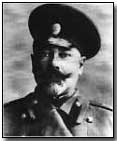Who's Who - Anton Denikin
 Anton Ivanovich Denikin (1872-1947)
served as post-February Revolution Chief of Staff to (in rapid succession)
Commander-in-Chief's
Alexeev, Brusilov
and Kornilov before
himself leading White anti-Bolshevik forces in south Russia.
Anton Ivanovich Denikin (1872-1947)
served as post-February Revolution Chief of Staff to (in rapid succession)
Commander-in-Chief's
Alexeev, Brusilov
and Kornilov before
himself leading White anti-Bolshevik forces in south Russia.
Born to relative poverty Denikin nevertheless succeeded against the odds in attaining a name for himself in the Tsar Nicholas II's imperial army. Following attendance at the Kiev Junker School and the Academy of the General Staff Denikin saw service during the humiliating Russo-Japanese War of 1904-05 which ended in Russian defeat.
Denikin was Chief of Staff of the Kiev military district with the rank of Major-General (a recent promotion) when war broke out in August 1914. Appointed Brusilov's Eighth Army Deputy Chief of Staff he was shortly afterwards handed command of the 4th Rifle Brigade in September 1914, together with a posting to the Carpathians and Galicia.
In 1916 he was appointed to command VIII Corps and saw action with Russian ally Romania during Brusilov's initially successful Brusilov Offensive. He was consequently appointed Southwestern Front Chief of Staff.
Despite his prominent role within the army Denikin nevertheless came out in favour of the Tsar's abdication during the February Revolution of 1917 which ultimately brought about Kerenski's appointment as head of the Provisional Government.
Denikin was then appointed Chief of Staff to three successive Commanders-in-Chief: Alexeev, Brusilov and Kornilov. Denikin came out in support of Kornilov's attempted government coup - with unfortunate results, since Denikin was arrested and imprisoned with the former Commander-in-Chief.
The October Revolution later the same year brought both Denikin and Kornilov an opportunity to escape from imprisonment. They consequently fled to join up with Alexeev in southern Russia to form the anti-Bolshevik White army.
Kornilov's death in the Spring of 1918 brought Denikin command of White forces, leading them in a series of successful actions in the northern Caucasus and along the Don. By the close of 1918 Denikin was appointed Commander of the Armed Forces of South Russia, in spite of diminishing Allied aid.
Denikin's attempt to seize control of Moscow in June 1919 proved a campaign too far: his force was comprehensively defeated at Orel in October; thereafter his force was in constant retreat, and was forced back to the Crimea by Spring 1920.
Realising the futility of the White cause Denikin resigned his post and went into a 27-year exile, where he published his memoirs together with an account of the Russian Revolution and consequent civil war.
He died in 1947.
Click here to read Denikin's official report into mutiny in the Russian Army, dated 28 July 1917.
A Battery was a group of six guns or howitzers.
- Did you know?
